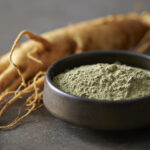Ginseng’s secret weapon: Battling cancer with ancient wisdom
 (NaturalHealth365) Once universally believed to have mystical powers, an ancient herbal root called “ginseng” is highly revered by many cultures as a life-giving plant. Originally used as a food source, it was discovered in the mountains of China over 5,000 years ago. After realizing its many health benefits, ginseng was soon named a divine plant in eastern Asia as it healed virtually all physical ailments. While ginseng is still considered sacred to many people, Western medicine hasn’t really recognized the value of this special root – until very recently.
(NaturalHealth365) Once universally believed to have mystical powers, an ancient herbal root called “ginseng” is highly revered by many cultures as a life-giving plant. Originally used as a food source, it was discovered in the mountains of China over 5,000 years ago. After realizing its many health benefits, ginseng was soon named a divine plant in eastern Asia as it healed virtually all physical ailments. While ginseng is still considered sacred to many people, Western medicine hasn’t really recognized the value of this special root – until very recently.
Today, scientific studies prove that ginseng has incredible properties that fight cancer – all types of cancer. This is a significant breakthrough as more than 40 percent of the world’s population will be affected by this devastating disease at some point in their lifetime.
Scientific evidence reveals ginseng as cancer’s secret weapon
According to a review article published in the Chinese Medicine Journal, ginseng’s secret weapon for fighting cancer is revealed through its compound called “ginsenosides.” Numerous studies demonstrate the beneficial effect of ginsenosides against deviant molecular processes that are responsible for cancer.
In fact, new studies are being published every day regarding its anti-inflammatory and antioxidant benefits. New research is also demonstrating its potential to kill cancer cells, as well as inhibit cancer’s uncontrolled growth, invasiveness, and angiogenesis.
Studies show that ginsenosides kill cancer cells
Several new studies exhibit apoptosis in cancer with the use of ginsenosides. Cell death has been demonstrated for several types, including breast, ovarian, cervical, and prostate cancers; melanoma; osteosarcoma; hepatocarcinoma; and lung cancers.
Of particular interest is ginsenosides’ metabolite Rg3. A report published in the Chemico-Biological Interactions journal demonstrated that the average volume of tumors treated significantly decreased by 40 percent when managed with Rg3.
Ginsenosides shown to halt tumor growth and cancer cell invasion
Aside from tumor growth, cancer cells can break away from their primary site and spread to other parts of the body via the bloodstream or lymphatic system. The invasive transmission poses a threat to life as cancer grows at secondary sites within the body. Recent studies have suggested that ginsenosides inhibit cancer metastasis and decrease its invasive ability.
An experimental study published in a Chinese Medical Journal reported ginsenosides can significantly inhibit the metastasis of ovarian cancer, while another study in Tumor Biology reported that it inhibits cell proliferation and invasion of prostate cancer. With or without other botanical compounds, more studies are showing ginsenosides significant effect on halting tumor growth and invasive cancer in some of the most progressive types of cancer.
Ginsenosides stop cancer from feeding itself
Angiogenesis is the term used for the development of new blood vessels and is the essential way that cancer nourishes itself. Without excess blood vessels to feed cancer cells, they are less likely to grow. Certain metabolites of ginsenosides – particularly compound K – have been discovered to inhibit angiogenesis.
Preventing cancer with ginseng
As a functional food, ginseng may be used as a cancer preventative and for general well-being. It is empirically known to be non-toxic and safe. According to studies, Panax ginseng is the most beneficial in helping to fight against cancer.
But, since ginseng also has stimulatory properties, the recommendation is for healthy adults to take it daily in the morning or early afternoon. Drink one cup of ginseng tea or take 10 to 30 drops of the extract in a beverage. For standardized dried extract, take 200 milligrams.
Fresh or dried ginseng root may also be taken daily at one-half to two grams. Naturally, with many supplements on the market, be sure the one you pick is certified organic. As always, consult with a holistic healthcare provider before starting a ginseng routine to determine the most suitable approach for your needs.
Sources for this article include:
NIH.gov
Nature.com
Link.springer.com
Hindawi.com
Sciencedirect.com
NIH.gov
NIH.gov



